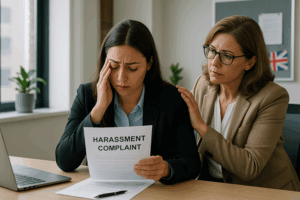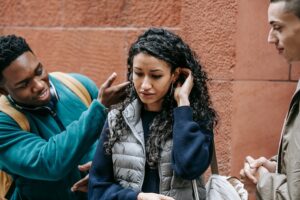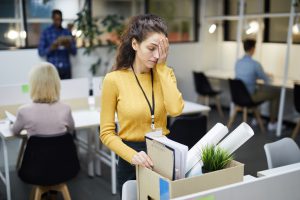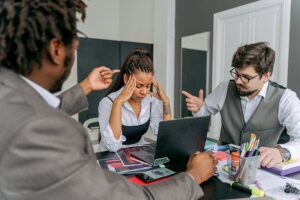All our legal advice articles
Our legal guides are written with the participation of its committee of expert lawyers.
Navigating the legal landscape can be challenging, yet it plays a crucial role in our everyday lives. That’s why we have created these comprehensive guides to demystify legal advice in the UK. Our articles provide clear and concise information on various areas of law, including family law, employment rights, and consumer protection.
Written with care, these resources are designed to help you better understand your legal questions and the steps you need to take. However, they are not a substitute for professional advice; we strongly encourage you to consult a qualified solicitor for personalized guidance tailored to your specific situation.
Contact one of our solicitors on Qredible
All our legal advice articles

Accused of sexual harassment at work: Legal rights & defence
Published on 11/07/2025, by Qredible - Reading time: 5 mins
By remaining calm, understanding rights in workplace investigations, and promptly seeking advice from specialist employment solicitors, anyone accused of sexual harassment can defend themselves thoroughly and protect their professional standing against both false and substantiated allegations.


What to do if you’re sexually harassed at work in the UK?
Published on 09/07/2025, by Qredible - Reading time: 7 mins
An inappropriate look, an insistent remark, and a whole day's routine is turned upside down. Sexual harassment at work, defined as unwanted behaviour of a sexual nature that undermines dignity or creates a hostile environment, represents a reality that is all too often ignored.


How to prove sexual harassment at work?
Published on 08/07/2025, by Qredible - Reading time: 5 mins
By maintaining detailed incident diaries, collecting written evidence, gathering reliable witness statements, and seeking legal support, you can build compelling sexual harassment cases recognised both internally and by sexual harassment tribunal proceedings.


Types of Alternative Dispute Resolution in the UK: Which one do you need?
Published on 07/07/2025, by Qredible - Reading time: 9 mins
Alternative dispute resolution types are structured methods for solving conflicts without stepping into a courtroom. Instead of judges, juries, and public hearings, you get private processes designed around your specific needs.


How much does probate cost in the UK?
Published on 07/07/2025, by Qredible - Reading time: 6 mins
To obtain probate, you must complete the relevant forms such as form PA1A, value the estate, pay the probate application fee, and possibly seek help from professionals, with each step influencing the final cost.


How to deal with a loved one’s finances after death?
Published on 04/07/2025, by Qredible - Reading time: 6 mins
Only those with probate or letters of administration, not relatives, power of attorney holders, or joint account holders (except for joint accounts). Don't risk costly mistakes or personal liability. Discover what steps to take when handling a loved one's finances after their passing.


What is Alternative Dispute Resolution (ADR) and how does it work?
Published on 27/06/2025, by Qredible - Reading time: 6 mins
What if you could resolve a dispute without going to court? Alternative Dispute Resolution (ADR) offers solutions that are effective, confidential and often faster than traditional legal proceedings.


Can I appeal an Employment Tribunal decision?
Published on 24/06/2025, by Qredible - Reading time: 5 mins
To succeed with an employment tribunal appeal, you mustquickly identify legal errors in the employment tribunal decision, meet the strict 42-day deadline, and seek professional legal to properly prepare and submit your challenge.

All our legal advice articles

choose a solicitor
Choosing the right solicitor can be a daunting task, yet it is essential to ensure you receive the legal support that meets your specific needs. At Qredible, we are dedicated to helping you find the solicitor who is right for you.
Our artic...
find out more >
commercial law
Commercial law governs the legal framework for businesses and commercial transactions in the UK. It covers a wide range of topics, including contracts, company formation, intellectual property, mergers and acquisitions, and dispute resolution. Thi...
find out more >
consumer Rights
Consumer rights law safeguards individuals when buying goods, services, or digital products in the UK. It ensures that consumers are treated fairly, receive what they paid for, and are protected against faulty or misleading products. This area of ...
find out more >
Conveyancing
Conveyancing is the legal process of transferring property ownership in the UK, essential for buying, selling, or leasing real estate. It involves drafting contracts, conducting property searches, registering ownership with the Land Registry, and ...
find out more >
criminal law
Criminal law is a cornerstone of the legal system in the UK, governing actions considered harmful to society and prescribing penalties for those found guilty. It addresses a wide range of offenses, from theft and fraud to serious crimes such as as...
find out more >
divorce
Divorce law is a fundamental legal field that governs the process of ending a marriage in the UK. It addresses key aspects such as filing for divorce, dividing marital assets, spousal maintenance, child custody, and visitation rights. The primary ...
find out more >
employment
Employment law is a crucial area of legal expertise that governs the relationship between employers and employees in the UK. It covers various aspects of the workplace, including employment contracts, wages, working hours, holidays, disciplinary a...
find out more >
family law
Family law is a vital area of legal practice that addresses relationships and responsibilities within families. In the UK, it covers a wide range of issues, including marriage, divorce, child custody, adoption, domestic abuse, and financial arrang...
find out more >
Human Rights
Human rights law safeguards the fundamental freedoms and dignity of individuals, ensuring fair treatment and protection from abuse. In the UK, these rights are enshrined in the Human Rights Act 1998, covering areas such as the right to life, freed...
find out more >
immigration
Immigration law governs the legal processes for entering, residing, and working in the UK. It addresses a variety of topics, including visa applications, asylum claims, citizenship, family reunification, and work permits. Designed to regulate move...
find out more >
landlord & tenant
Landlord and tenant law governs the relationship between property owners and renters in the UK, ensuring fair treatment and clarity for both parties. It covers key aspects such as tenancy agreements, rent payments, deposit protection, repairs, evi...
find out more >
litigation
Litigation refers to the legal process of resolving disputes through the courts, whether between individuals, businesses, or other entities. It covers a wide range of cases, from breach of contract to personal injury claims and property disputes. ...
find out more >
neighbour disputes
Neighbour disputes arise from conflicts over property boundaries, noise, shared spaces, or other issues that affect the peaceful enjoyment of one’s home. In the UK, the law provides various avenues for resolving such disputes, from informal mediat...
find out more >
personal injury
Personal injury law helps individuals who have been harmed due to the negligence or wrongdoing of others. In the UK, this area of law covers a wide range of cases, including workplace accidents, road traffic collisions, medical negligence, and sli...
find out more >
tax
Tax law governs the rules and regulations surrounding the payment of taxes in the UK. It covers various areas, including income tax, corporate tax, VAT, inheritance tax, and capital gains tax. Understanding tax law is essential for individuals and...
find out more >
wills probate & estate
Wills, probate, and estate law governs what happens to a person’s assets when they pass away. Whether you’re drafting a will, navigating probate, managing an estate, or facing an inheritance dispute, it’s essential to understand the legal pr...
find out more >The strength of a society is measured by its commitment to justice, safeguarded by its solicitors.
Platon
Find a solicitor
With over 2,000 solicitors listed, find the one best suited to your needs. We will then help you get in touch.
Contact a solicitor

















